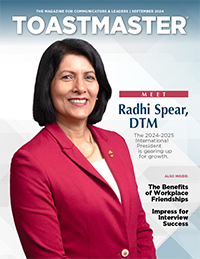
You prepared and practiced your speech, honed your point, and perfected your slides and stories. The audience is engaged as you deliver it, inspired as you enter the final minute, and then—self-sabotage!
In gymnastics terms, you didn’t stick the landing. Instead, you used ideas that diluted or distanced your point instead of reinforcing it. This misstep is a sharp dagger in the side of your impact on the audience because your final words represent your last and most potent opportunity to leave the audience with your biggest idea.
What did you do to end on such a low note? Perhaps it was one of these five mistakes:
1 You fell prey to “Last Slide Syndrome.”
How many times have you seen a speaker end a presentation with “Well, that’s the last slide …” or “So, that’s all I got … ” or even “With that said …” These phrases may be self-soothing but what you’re really telling the audience is that you just wanted to get through the presentation, not deliver a valuable point. Understand your true point and end with an expression that reinforces it.
2 You rushed into the next piece of business.
Some speakers end with a concluding point, then rush into the next piece of meeting business, such as a Q&A session or introducing the next speaker. Remember that your audience needs twice as long to hear, digest, comprehend, and apply relevance to your point as you need to merely communicate it. Rushing into another meeting moment robs your audience of that critical moment of reception.
This doesn’t mean you can’t start a Q&A or introduce another speaker following your speech. Just pause before you do—as if starting a new book chapter—and allow your final point to sink in.
3 You outsourced your authority to a dead guy.
Some people think it’s a good idea to end with a brilliant quotation. It’s not a good idea, and here’s why: You researched the topic, did the work, created your presentation, and otherwise qualified yourself to make these points. Why outsource the final reinforcing thoughts to someone you’ve never met, doesn’t know you or your presentation, and is likely long dead?
Sticking the landing isn’t just about completing your speech; it’s about reinforcing your point.
Ending with a famous quotation may be entertaining, even thought-provoking, but it’s typically irrelevant because there’s such a shallow connection between the quote and your point. Remember: You are responsible for creating, sustaining, and conveying your point. Finalize that role by ending the presentation yourself.
4 You didn’t reinforce your point.
Sticking the landing isn’t just about completing your speech; it’s about reinforcing your point. So don’t just end on your last piece of data, last slide, or last story. End by restating your overall point clearly, concisely, and confidently, then stop. Often, audiences will only remember the last thing you say, so take the opportunity to convey the idea that matters most.
Strengthen that reinforcement by using starter phrases like the traditional “In conclusion …” You can also use phrases such as “Here’s the thing …” or “If you take one thing away from my presentation, I hope it’s this …” and then make your point once more.
5 You didn’t look up.
Whether in a room or on a Zoom call, eye contact is critical, especially at the very end of your presentation. If your point is a nail, your eyes can be the hammer. So whether you prepare far in advance or immediately in the moment, say your final reinforcing words directly to your audience, who appreciate it—not to your notes or PowerPoint slides, who couldn’t care less.
Realizing that the ending of your presentation may be more important than any other moment can help you prepare for and practice that ending in a way that will sustain your audience’s interest and inspiration.
Joel Schwartzberg is the senior director of strategic and executive communications for a U.S. national nonprofit; a presentation coach; and author of The Language of Leadership: How to Engage and Inspire Your Team and Get to the Point! Sharpen Your Message and Make Your Words Matter. Follow him on X @TheJoelTruth.


 Previous
Previous

 Previous Article
Previous Article

